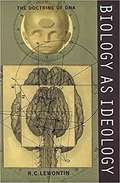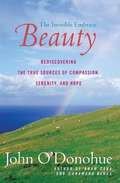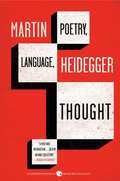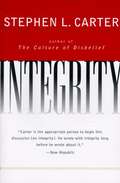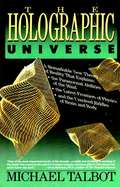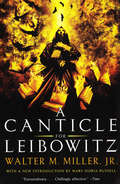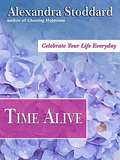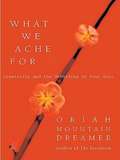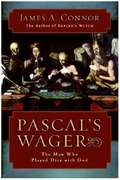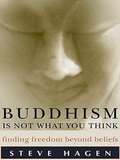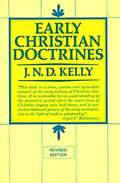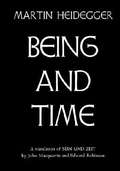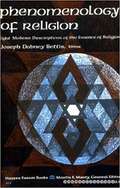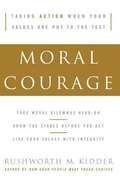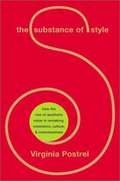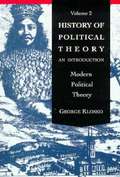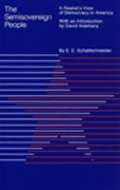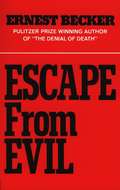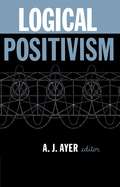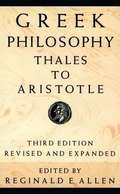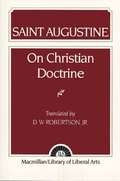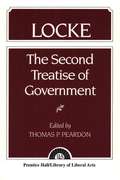- Table View
- List View
Biology As Ideology: The Doctrine Of DNA
by Richard C. LewontinFollowing in the fashion of Stephen Jay Gould and Peter Medawar, one of the world's leading scientists examines how "pure science" is in fact shaped and guided by social and political needs and assumptions.
Beauty: The Invisible Embrace
by John O'DonohueBeauty does not linger, it only visits. <p><p> Yet beauty's visitation affects us and invites us into its rhythm, <p> it calls us to feel, think, and act beautifully in the world: <p> to create and live a life that awakens the Beautiful. <p> Beauty is a gentle but urgent call to awaken. Bestselling author John O'Donohue opens our eyes, hearts, and minds to the wonder of our own relationship with beauty by exposing the infinity and mystery of its breadth. His words return us to the dignity of silence, profundity of stillness, power of thought and perception, and the eternal grace and generosity of beauty's presence. In this masterful and revelatory work, O'Donohue encourages our greater intimacy with beauty and celebrates it for what it really is: a homecoming of the human spirit. As he focuses on the classical, medieval, and Celtic traditions of art, music, literature, nature, and language, O'Donohue reveals how beauty's invisible embrace invites us toward new heights of passion and creativity even in these uncertain times of global conflict and crisis.
Poetry, Language, Thought (Harper Perennial Modern Thought Ser.)
by Martin HeideggerPoetry, Language, Thought collects Martin Heidegger's pivotal writings on art, its role in human life and culture, and its relationship to thinking and truth. Essential reading for students and anyone interested in the great philosophers, this book opens up appreciation of Heidegger beyond the study of philosophy to the reaches of poetry and our fundamental relationship to the world. Featuring "The Origin of the Work of Art," a milestone in Heidegger's canon, this enduring volume provides potent, accessible entry to one of the most brilliant thinkers of modern times.
Integrity
by Stephen L. CarterIn this book, Stephen Carter examines why the virtue of integrity holds such sway over the American political imagination. By weaving together insights from philosophy, theology, history and law, along with examples drawn from current events and a dose of personal experience, Carter offers a vision of integrity that has implications for everything from marriage and politics to professional football. He discusses the difficulties involved in trying to legislate integrity as well as the possibilities for teaching it.
The Holographic Universe
by Michael TalbotThese relatively new data are of such far-reaching relevance that they could revolutionize our understanding of the human psyche, of psychopathology, and of the therapeutic process. Some of the observations transcend in their significance the framework of psychology and psychiatry and represent a serious challenge to the current Newtonian-Cartesian paradigm of Western science. They could change drastically our image of human nature, of culture and history, and of reality.
A Canticle for Leibowitz
by Walter M. Miller Jr.The Flame Deluge was over, the earth was dead and all knowledge has been eradicated. In a desert, a monk unearths a link to 20th-century civilization, and with his colleagues, vows to preserve the ancient knowledge until mankind is ready to receive it.<P><P> Hugo Award winner.
Time Alive: Celebrate Your Life Every Day
by Alexandra StoddardIn seven sections representing essential domains of life -- Time, Home, Style, Enthusiasm, Caring, Purpose, and Spirit -- Alexandra Stoddard shows us how to celebrate every moment of life. This treasury of brief essays is chock-full of the wise ideas, personal anecdotes, and practical strategies that have inspired millions of her readers and audiences to live more beautifully and meaningfully every day. She helps readers form their own personal philosophy for living as well as discover specific, small actions that build tranquil time into the most hectic day, add lightness and energy when needed most, elevate a passing moment into a vivid memory. She encourages readers to "take stock, and rethink everything. We need to make the connection between how we spend our time and how well we live our lives." With each essay offering a memorable mindset for living, Alexandra's observations are searching ("What is your deepest desire?"), surprising ("Lower your standards"), encouraging ("You have 8,766 hours a year to act wisely"), and whimsical ("You've gotta have a look") and are certain to spur readers to new levels of insight and joy.
What We Ache For: Creativity and the Unfolding of Your Soul
by Oriah Mountain DreamerInspirational guide to awakening personal creativity in any art form. Dreamer uses practical examples to convey the link between creativity, spirituality, and sexuality while showing how all 3 can enrich one's life.
Pascal's Wager: The Man Who Played Dice with God
by James A. ConnorJames Connor explores both the intellectual giant whose theory of probability paved the way for modernity and the devout religious mystic who dared apply probability to faith.
Buddhism Is Not What You Think: Finding Freedom Beyond Beliefs
by Steve HagenAccomplished Zen teacher explores some of the religions most essential questions. Draws on life experience and stories of various Buddhist teachers in order to dispel misconceptions and educate on topics such as wisdom, compassion, awareness, and what it means to be awake. Written in prose, The author's words are meant to appeal to newcomers and those who are already familiar with the faith. Hagen explains that Buddhism is based on life experience and not just thoughts about experience. The book aims to guide the reader towards a path to joy and freedom.
The Psychology Of Moral Development: The Nature and Validity of Moral Stages (Essays On Moral Development #Vol. 2)
by Lawerence KohlbergThe Psychology of Moral Development: The Nature and Validity of Moral Stages
Early Christian Doctrine
by J. N. D. KellyThis revised edition of the standard history of the first great period in Christian thought has been thoroughly updated in the light of the latest historical findings. Dr. Kelly organizes an ocean of material by outlining the development of each doctrine in its historical context. He lucidly summarizes the genesis of Chrisitian thought from the close of the apostolic age to the Council of Chalcedon in the fifth century--a time teeming with fresh and competing ideas. The doctrines of the Trinity, the authority of the Bible and tradition, the nature of Christ, salvation, original sin and grace, and the sacraments are all extensively treated in these pages. <p><p>This revised edition of Early Christian Doctrines includes: <p> <p>• Sweepingly updated early chapters <p>• Revised and updated bibliographies <p>• A completely new chapter on Mary and the saints
Being and Time
by Martin HeideggerWhat is the meaning of being?" This is the central question of Martin Heidegger's profoundly important work, in which the great philosopher seeks to explain the basic problems of existence. A central influence on later philosophy, literature, art, and criticism--as well as existentialism and much of postmodern though.
Phenomenology Of Religion: Eight Modern Descriptions Of The Essence Of Religion (Forum Books Series)
by Joseph D. BettisPhenomenology of Religion: Eight Modern Descriptions of the Essence of Religion
Moral Courage
by Rushworth M. KidderIn a book rich with examples, Rushworth Kidder reveals that moral courage is the bridge between talking ethics and doing ethics. He explains that the courage to act is found at the intersection of three elements: action based on core values, awareness of the risks, and a willingness to endure necessary hardship. He demonstrates the benefits of ethical action to the individual and to society -- and the severe consequences that can result from remaining morally dormant.
The Substance of Style: How the Rise of Aesthetic Value Is Remaking Commerce, Culture, and Consciousness
by Virginia PostrelWith thorough scholarship, this highly acclaimed editor and journalist argues that aesthetic appreciation of the sleek and colorful surfaces of commercial goods and activities has value and legitimacy in spite of the disparagement of austere critics who demand that form follow function.
Chuang Tzŭ: Taoist Philosopher and Chinese Mystic
by Zhuang Zi Herbert A. GilesChuang Tzŭ belongs to a period three or four centuries before Christ. A disciple of Lao Tzŭ, his writings, which as a consequence are mostly allegorical, are an attempt to refute the materialistic Confucian teaching that arose after Lao Tzŭ's death. Although Chuang Tzŭ failed in his aims, he left a work of marvellous literary beauty and great originality. This classic translation makes Chuang Tzŭ available to English readers with the aid of a running commentary incorporated in the body of the text.
History Of Political Theory An Introduction: Volume 2 Modern Political Theory
by George KloskoThe second volume of HISTORY OF POLITICAL THEORY provides an in-depth introduction to a select group of political thinkers. Professor Klosko weaves together excerpted materials with insightful commentary to create this thematically unified look at the central theoretical arguments of liberal political theory.
The Semi-Sovereign People: A Realist's View of Democracy In America
by Elmer E. SchattschneiderThis book started out to be an attempt to formulate a theory of political organization. The assumption made throughout is that the nature of political organization depends on the conflicts exploited in the political system, which ultimately is what politics is about. The thesis is that we shall never understand politics unless we know what the struggle is about.
Escape from Evil
by Ernest BeckerFrom the Pulitzer Prize-winning author of The Denial of Death, a penetrating and insightful perspective on the source of evil in our world.
Logical Positivism (The Library Of Philosophical Movements)
by A. J. AyerEdited by a leading exponent of the school, this book offers--in the words of the movement's founders--logical positivism's revolutionary theories on meaning and metaphysics, the nature of logic and mathematics, the foundations of knowledge, the content of psychological propositions, ethics, sociology, and the nature of philosophy itself.
Greek Philosophy: Thales to Aristotle (Third Edition)
by Reginald E. AllenEvery history of philosophy begins with Thales, and records with proper solemnity his opinion that the source of all things is water. And every beginning student is shocked. Not until he reaches Plato and Aristotle does he find himself in a world recognizably his own, a world whose science, law, and logic are of a type his own experience has made familiar. The pronouncements of philosophers are usually answers to questions, whether or not the questions are explicitly put. If Thales claimed that the source of all things is water, his question must presumably have been, What is the source of all things?
On Christian Doctrine
by Saint Augustine"Since the dawn of the fifth century, theology students, religious scholars, and ordinary Christians have turned to this volume for instruction. Written by one of the foremost leaders in the development of Christian thought, it offers clear guidance on how to read the Bible and understand the true meaning of scripture."-amazon.com
